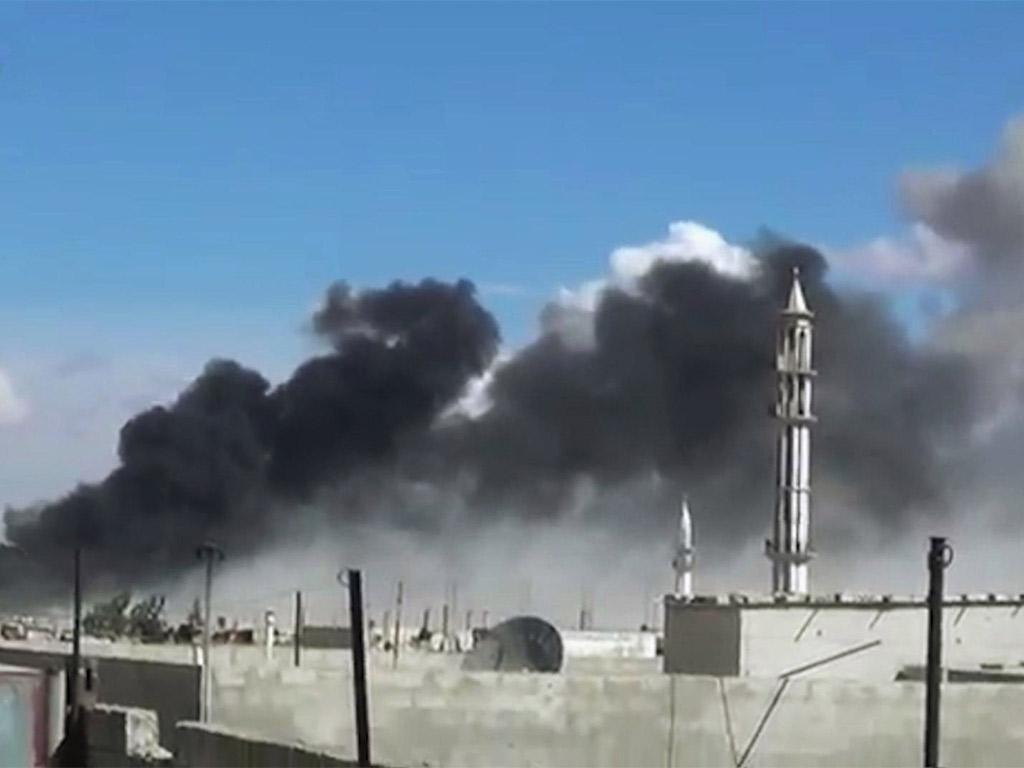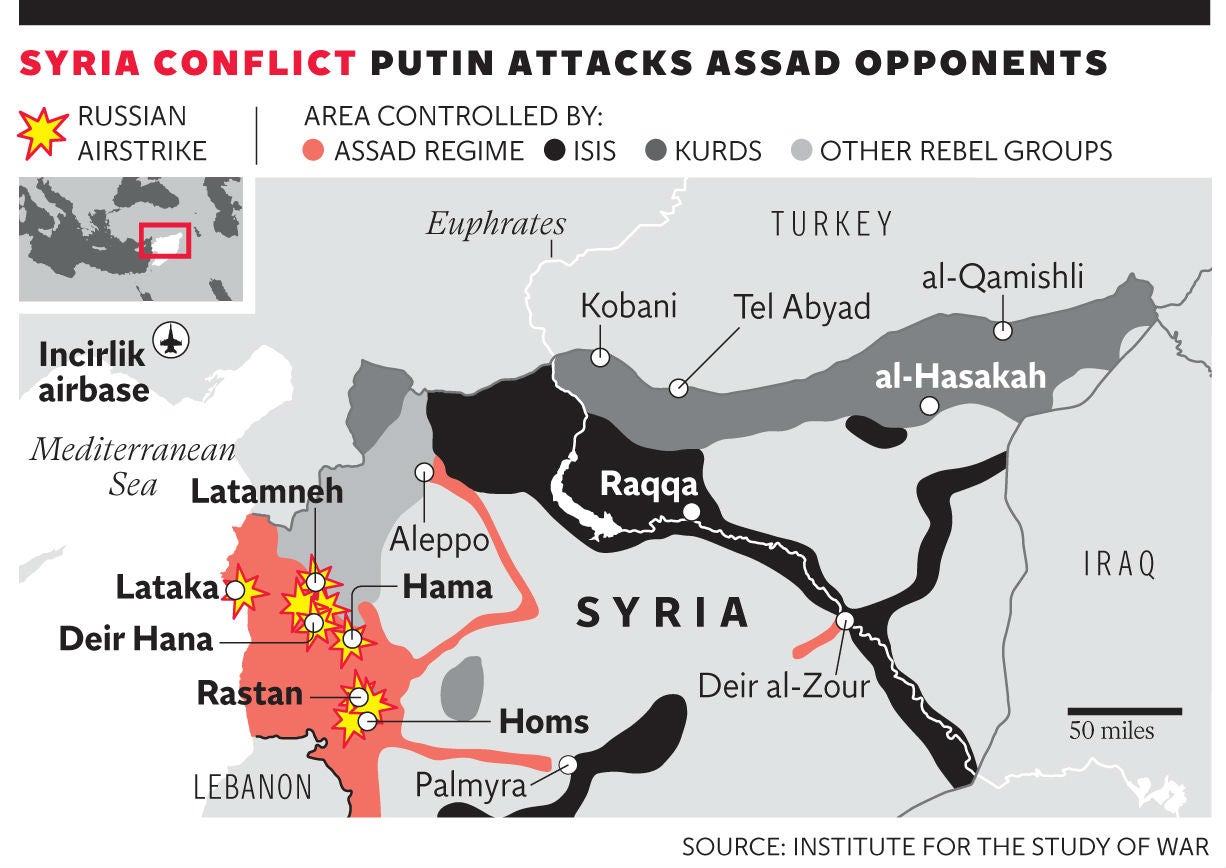Russia air strikes in Syria: Moscow accused of 'pouring gasoline on the fire' as UN seeks answers
Moscow insists their operation is targeting Isis, while others suggest Mr Putin is propping up the Assad regime

Your support helps us to tell the story
From reproductive rights to climate change to Big Tech, The Independent is on the ground when the story is developing. Whether it's investigating the financials of Elon Musk's pro-Trump PAC or producing our latest documentary, 'The A Word', which shines a light on the American women fighting for reproductive rights, we know how important it is to parse out the facts from the messaging.
At such a critical moment in US history, we need reporters on the ground. Your donation allows us to keep sending journalists to speak to both sides of the story.
The Independent is trusted by Americans across the entire political spectrum. And unlike many other quality news outlets, we choose not to lock Americans out of our reporting and analysis with paywalls. We believe quality journalism should be available to everyone, paid for by those who can afford it.
Your support makes all the difference.Russia has launched its first air strikes inside Syria, setting off a scramble at the United Nations and in Western capitals to understand Moscow’s targets: the assets of the Islamic State as it claimed, or other enemies of its ally and leader of the Syrian regime, Bashar al-Assad, and civilians.
While Moscow insisted the operation had targeted Isis, US and French officials said the attacks had been in an area west of Homs, where Isis rebels are absent but where Mr Assad’s forces have been losing control. There were also reports from at least one moderate rebel group that its assets had been hit by the Russian jets and claims of civilian casualties.
The Russian Defence Ministry posted a video online (below), showing aerial footage of bombs being dropped. The ministry said jets hit "eight facilities, including munition, armement and POL storages, combat vehicles, command and communication posts". It also said pilots "completely destroyed HQ and coordination centres of the Isis troops located in the mountains."
Activists and one rebel commander said via social media that the air strikes had mostly hit moderate rebel positions and civilians. US Defence Secretary Ash Carter said Russia was “pouring gasoline on the fire” in Syria. “It appears the strikes were in areas where there were not Isil forces and that is one of the problems with this sort of approach,” he said at the Pentagon. He added that Russia had advised the US that the operation was to begin within an hour – an approach “we do not expect”.
Russia first set off alarm bells in the West when it began in recent weeks to deploy significant military personnel and hardware to Syria. This week President Putin warned at the UN General Assembly that he was preparing strikes.
These air strikes complicate Western efforts to weaken Isis and respond to the broader Syrian conflict. The US already heads a 65-strong coalition of nations fighting Isis, some of which are joining the US in air strikes.
It appears the strikes were in areas where there were not Isil forces and that is one of the problems with this sort of approach
Philip Hammond, the UK Foreign Secretary, told reporters in New York that it was one thing if Russia was bombing Isis targets in Syria but was a “very different issue” if its operations were carried out in support of the Syrian President. “The targets won’t have been selected by accident.”
Russian foreign ministry spokeswoman Maria Zakharova told Russia’s LifeNews TV station that the reports of civilian casualties are part of an “information war”.
At a high-level meeting of the UN Security Council in New York, Laurent Fabius, France’s Foreign Minister, said “verification is under way” to understand the exact nature of the Russian strikes but he made it clear that “initial indications” show they had not targeted Isis zones. In recent days the US and other Western nations have said that, in principle, they would welcome Russia joining the existing effort to hit Isis militarily but on several conditions, notably that Moscow does not use its military might to aid President Assad, whose military position in the four-year civil war has worsened of late. They insist that Russia accept that any political transition for Syria does not envision Mr Assad staying in power in the long term or him becoming a candidate in eventual presidential elections.
“We are clear that if Russia wants to join with the coalition, working alongside the coalition, in air strikes we would welcome that,” Mr Hammond said. “Trying to prop up Assad as part of a counter-Isil strategy simply will not work… all you will do is drive the entire opposition to Assad into a single camp led by Isil. That is the worst possible outcome.”
Mr Fabius said another condition of Russia joining the anti-Isis coalition is that Mr Assad be forced to desist from using barrel and chlorine bombs against his citizens.

Back in Moscow, Mr Putin said in a televised speech that Russia had no intention of engaging in a ground war and characterised the air strikes as being directed at Isis and other terror groups in Syria, which are known to have attracted about 2,400 Russian recruits.
“If they [militants] succeed in Syria, they will return to their home country, and they will come to Russia, too,” Mr Putin declared. The strikes came within hours of Russian lawmakers authorising military operations in Syria.
Advance warning was transmitted by a Russian official to the US embassy in Baghdad, accompanied by a request that the US desist from flying coalition planes while the Russian operation was under way. One concern in the West is that there should be no accidental conflict between their own and Russian warplanes in Syrian air space. The US went ahead with strikes in the Aleppo area, far from the Russian jets’ strikes.
Republicans seized on the new development to assail Barack Obama for failing to grasp Mr Putin’s true intentions –to exert new influence in the Middle East. “It did not have to be this way,” railed Senator John McCain. “But this is the inevitable consequence of hollow words, red lines crossed, tarnished moral influence.” He added: “We should not be outsourcing getting rid of Isis to Russia.”
Join our commenting forum
Join thought-provoking conversations, follow other Independent readers and see their replies
Comments